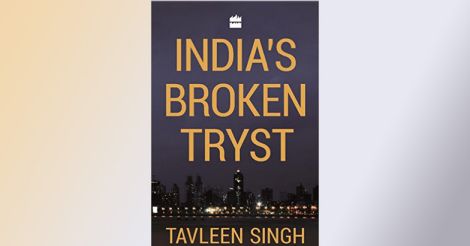Tavleen Singh's latest book “India’s Broken Tryst” involves two strands which she has combined to give an insight into what has gone wrong with the political class and governance during the near seven decades after India won independence.
The first strand details her interactions with the children who live in the pavement outside her Marine Drive apartment block in Mumbai while the second one gives her take on the political leadership that is held responsible for all the ills that plague India. The interactions with the street children show a facet of the author markedly different from the one of the aggressive and feisty persona that her writings seek to convey.
Her efforts to provide a daily meal to the children, her fights on their behalf with the authorities enforcing the laws, her attempts to rescue some of them to a better life from what they were used to and the shocking indifference with which loss of life is accepted by the pavement dwellers make interesting reading. Such stories never have a fairy tale ending but Tavleen Singh has shown courage to write on this topic, which in addition to being non glamorous, also presents as one which is unlikely to increase the sales of the book.
If her writing about the plight of pavement dwellers deserves plaudits, her commentary on the political leadership of the country is seriously flawed on account of her no holds barred rivalry with Sonia Gandhi. While it is remarkable that she has been honest about her hatred towards the person who was considered as the most powerful person in the country till the general elections of 2014, it has seriously coloured her views and opinions about members of the Gandhi family who led the country during 38 out of the first 42 years after independence.
Her view that successive governments in Delhi were never serious about tackling issues such as poverty and providing basic education and primary health care to the large masses of population may find many takers, though it is not fair to blame one family alone for this state of affairs. She has been critical of the Nehruvian model of governance and argues convincingly that it has been perpetrated by a coterie of self serving politicians and bureaucrats based in Delhi for meeting their selfish ends. Her disenchantment with the Nehruvian model is so complete that she even attributes continuing of this as one of the reasons for failure of Vajpayee during his years in power. Her trenchant criticism of the policies followed By Pandit Nehru, besides being grossly unjust, does great disservice to the numerous institutions that he built and nurtured, the fruits of which are enjoyed by all Indians.
Tavleen Singh was once a member of the close coterie surrounding Rajiv Gandhi; however, she ceased being a “Durbari" once she fell out of favour with Sonia Gandhi. She has cited a raid by officials of the Enforcement Directorate and the action against the township Lavasa, being built by her partner Ajit Gulabchand, as instances where the machinery of the state was misused by Sonia Gandhi to put her in her place. She has also narrated an incident where she came face to face with Sonia Gandhi and was described by the latter as "you who hate me the most."
When such strong personal hostilities exist, it is only natural that the narrative suffers from a tinge of bias and prejudice. Despite professing her hatred for the abuse of power and violation of laws by the members of the political class and the upper rungs of bureaucracy, she shows that she also is not above misusing her access to senior officials, as when she managed to get out of Agra during the summit talks between Vajpayee and Musharaff.
If one is looking for any new insight into why India did not keep the tryst with destiny in the nearly seven decades since independence, this book would turn out to be a disappointment. However, Tavleen Singh brings to this work the very qualities that has made her a name to reckon with in the national media- those of elegant prose, easy narrating style and access to the power centres in Delhi. The depth and gravitas that could have been achieved on account of her interactions with pavement dwellers remain unattained on account of her penchant for the glib and the superficial, and of course, for laying the blame for all that is wrong with the country on the Nehru Gandhi family.
About the author
Tavleen Singh a popular columnists in India, started her a career as a a reporter with “The Statesman” on the eve of the infamous Emergency. She had graduated to being a correspondent and subsequently a columnist, before moving over to the visual media, while continuing her columns. She has been a prolific writer, having penned six books, all belonging to the best selling class, besides being a bold non conformist in real life. Her books and writings attract as much attention for their contents as for the elegant manner in which words flow from her pen. She has been following the national political scenario very closely during the last four decades and her USP is the access that she has to the insiders within the corridors of power in Delhi.
(The author is the Customs Commissioner, Kochi)
























